バングラデシュ雨季中の子どもたちの様子
【2019年7月の活動報告】
今期(2018年10月~2019年9月)のユーグレナクッキー配布目標230万食に対し、7月までに約178万食(進捗率:77%)を配布しました。これは、当初の目標に対し約15万食分が不足していることになります。理由は、ラマダン(断食)の影響により学校の開校日が少なくなったからです。バングラデシュでは、ラマダンの影響により夏休み期間が増減します。昨年は2ヵ月で約35日間の開校日でしたが、今年は約25日間の開校日に留まり、10日間多く休校となりました。これに伴い、2019年9月までのユーグレナクッキー配布数は210万食となる見込みです。
皆様のご支援により運営させていただいているGENKIプログラムにおいて、目標を達成できないことを深くお詫びいたします。2019年10月からの配布に関しては、今まで以上に学校と連携し、本プログラムを実施いたします。
1.雨季中の子どもたちの様子
バングラデシュでは、5月中旬から10月中旬が雨季で、7月が最も降水量の多い月です。頻繁に足元や膝が浸かる程度の洪水が起こります。GENKIプログラムの子どもたちも、登下校時苦労しています。多くの子どもたちは自宅から15分以上かけて通学しています。日本のように道路が整備されていないため、通学路で転倒しないよう、慎重に歩く必要があります。子どもたちは、雨季には乾季よりも10分程余裕をもって、自宅を出発します。スラムの子どもたちは、一般的にビーチサンダルのような簡易的な靴を履いています。暑さ対策且つ安価(1足 約70円)に入手できる理由から、このような靴を選んでいます。子どもたちは、学校に到着するとすぐに、足首まで泥に浸かり汚れてしまった足をバケツに入った水で洗います。その後、タオルで足を拭いてから教室に入ります。このような風景は、スラム街の小学校ではよくみられます。
この時期、GENKIプログラムを運営する上で、注意している点があります。それは、冠水した悪路でもユーグレナクッキーを無事学校に配達できるよう、ユーグレナクッキーを製造・配達するナビスコ社に早めの発注をし、余裕をもったスケジュールで進めることです。このような対応により、子どもたちは季節を問わず、ユーグレナクッキーを食べることができています。
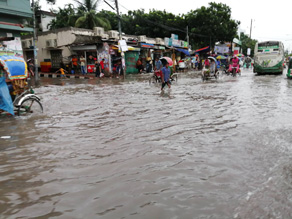
写真-1:冠水した道路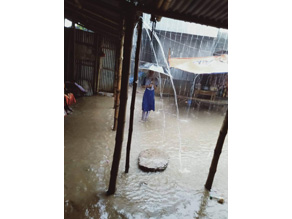
写真-2:登校時自宅前の状況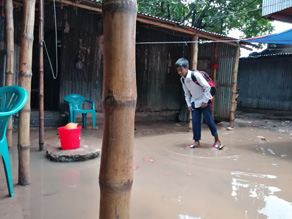
写真-3:学校に到着、足が浸かってしまった子ども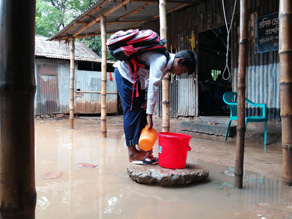
写真-4:雨で汚れた足を洗う子ども
2.バングラデシュの小学校の授業科目紹介
これまでもバングラデシュの教育制度や試験についてご説明してきましたが、今月は小学校の授業科目について日本と異なる点を2点ご紹介します。
1点目は科目数です。以下の通り日本では6年間で12科目を学びますが、バングラデシュでは6科目です。
| 国 | 科目数 | 科目名 |
|---|---|---|
| 日本 | 12 | 国語、算数、理科、社会、生活(1・2年生)/総合(3~6年生)、音楽、図工、家庭科(5・6年生)、体育、道徳、外国語活動(5・6年生)、特別授業 |
| バングラデシュ | 6 | ベンガル語、算数、英語、理科、社会、宗教 |
音楽、図工、体育、家庭科といった授業は、中学校で学びますが、小学校では学びません。また、日本のように音楽室、図工室といった教室、楽器などの設備はありません。しかし、独自に授業を行う小学校もあります。例えば、アパラジョ小学校では、週1回音楽の先生を呼び「ハーモニウム」と呼ばれるインド原産の鍵盤楽器を使ってバングラデシュの伝統的な歌を教えています。子どもたちは習った歌を休み時間に練習するなど、音楽の授業をとても楽しみにしています。
2点目は、宗教の授業です。日本でいう道徳の授業になります。バングラデシュでは約90%がイスラム教徒です。ヒンドゥー教徒、仏教徒、キリスト教徒は合計約10%と少数派ではありますが、各宗教の祝日が制定されています。また、一部の学校では、ヒンドゥー教、キリスト教など宗教ごとの授業があります。その場合ベンガル語や算数などの一般科目は、全員で授業を受けますが、宗教の授業は宗教ごとに分かれ、それぞれの先生のもとで勉強します。このようにバングラデシュでは、少数派宗教も尊重されています。
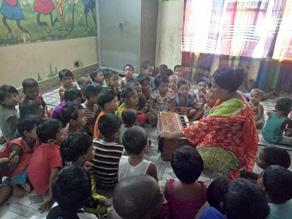
写真-5:「ハーモニウム」を使った音楽の授業の様子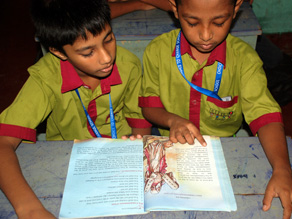
写真-6:キリスト教を勉強する子どもたち
3.デング熱対策について
現在、バングラデシュでは、蚊によって媒介する感染症「デング熱」が過去最高のペースで急増しています。デング熱はネッタイシマカやヒトスジシマカというデングウイルスを持った蚊に刺されることで感染します。感染すると発熱、激しい頭痛を引き起こし、症状が重くなると死亡することもあります。人から人に直接感染することはありません。
2018年の年間デング熱感染者が10,150人だったのに対し、2019年は1月以来、感染者は7月末時点で13,600人を超えました。その内、半数弱の8,348人は7月に入り感染が確認された患者です。5月の184人、6月の1,820人に比べ激増していることがわかります。同国では例年、雨季で蚊が増加する6月から11月にかけて感染が増えます。そして、例年9月頃から入院患者が増えますが、今年は7月から既に入院患者で溢れている状況です。感染者は同国全土で確認されていますが、人口が多い首都ダッカでは特に感染者が増えています。
GENKIプログラム対象校でも、数人がデング熱にかかっており、学校でも蚊に刺されないよう注意を促しています。具体的には授業でウイルスを持った蚊の特徴の説明、長袖長ズボンなどの着用、就寝時の蚊帳の使用などの対策を講じるよう、指示しています。子どもたちは就寝時だけではなく自宅での勉強中も、蚊帳の中にいるなど注意を払っています。
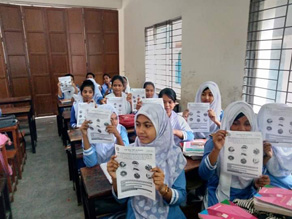
写真-7:授業でデング熱対策について学ぶ子どもたち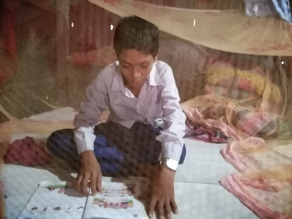
写真-8:蚊帳の中で勉強する子ども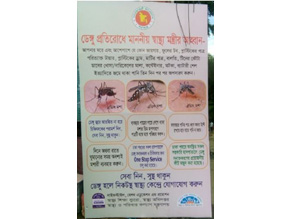
写真-9:政府によるデング熱への注意を促す看板
引き続きご支援をよろしくお願いいたします。
株式会社ユーグレナ
海外事業開発部 / バングラデシュ事務所

